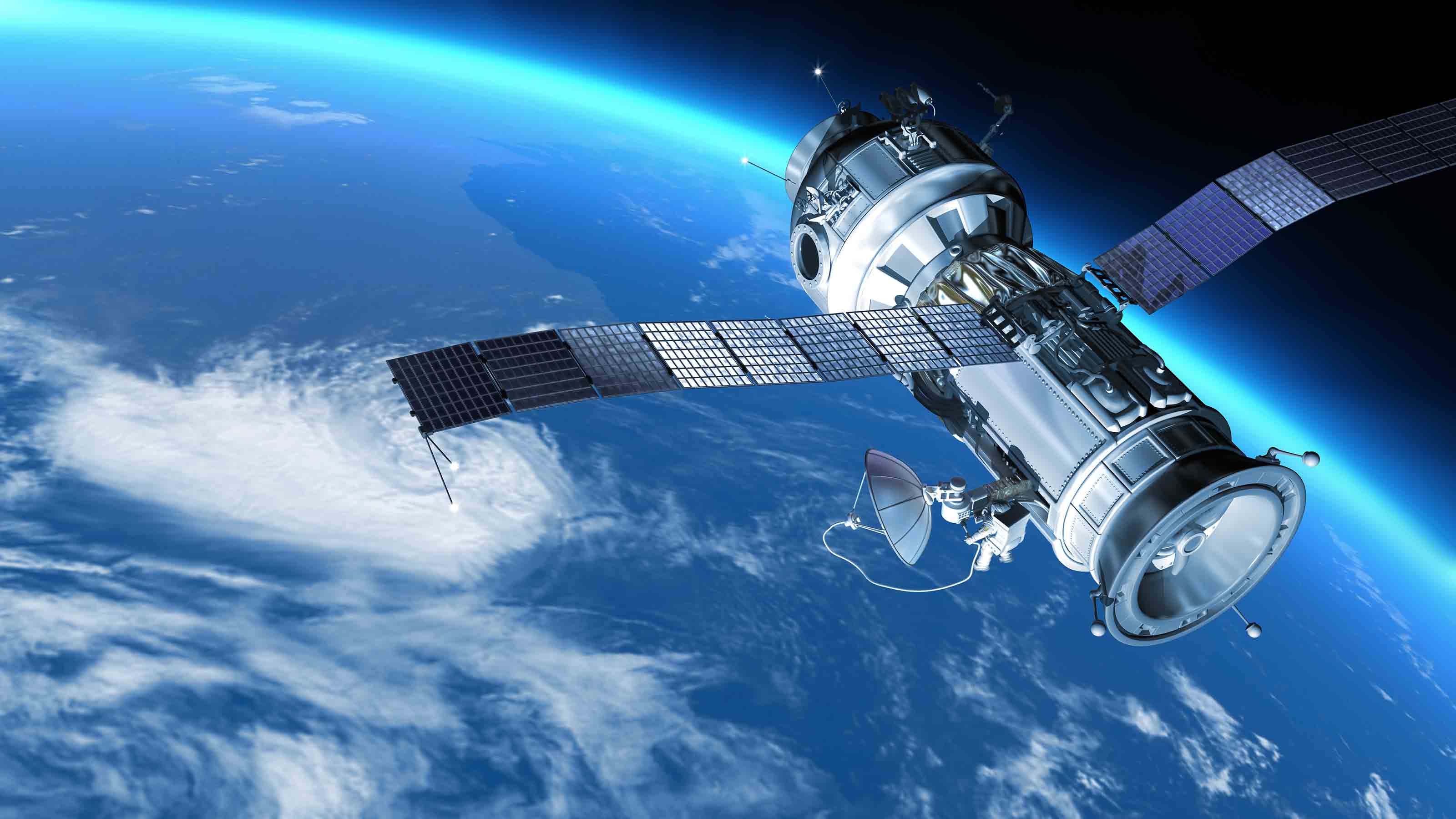Space Stocks: How Russia Is Changing the Game
Russia's invasion of Ukraine has had a number of far-flung effects, including shifting fortunes in space investing.


Profit and prosper with the best of Kiplinger's advice on investing, taxes, retirement, personal finance and much more. Delivered daily. Enter your email in the box and click Sign Me Up.
You are now subscribed
Your newsletter sign-up was successful
Want to add more newsletters?

Delivered daily
Kiplinger Today
Profit and prosper with the best of Kiplinger's advice on investing, taxes, retirement, personal finance and much more delivered daily. Smart money moves start here.

Sent five days a week
Kiplinger A Step Ahead
Get practical help to make better financial decisions in your everyday life, from spending to savings on top deals.

Delivered daily
Kiplinger Closing Bell
Get today's biggest financial and investing headlines delivered to your inbox every day the U.S. stock market is open.

Sent twice a week
Kiplinger Adviser Intel
Financial pros across the country share best practices and fresh tactics to preserve and grow your wealth.

Delivered weekly
Kiplinger Tax Tips
Trim your federal and state tax bills with practical tax-planning and tax-cutting strategies.

Sent twice a week
Kiplinger Retirement Tips
Your twice-a-week guide to planning and enjoying a financially secure and richly rewarding retirement

Sent bimonthly.
Kiplinger Adviser Angle
Insights for advisers, wealth managers and other financial professionals.

Sent twice a week
Kiplinger Investing Weekly
Your twice-a-week roundup of promising stocks, funds, companies and industries you should consider, ones you should avoid, and why.

Sent weekly for six weeks
Kiplinger Invest for Retirement
Your step-by-step six-part series on how to invest for retirement, from devising a successful strategy to exactly which investments to choose.
The Russian invasion of Ukraine has taken the battlefront to space in unprecedented ways, whether it's tracking an opponent’s attack using imagery from a satellite or having one held hostage or shot out of space when one of that arena's biggest players throws its weight around. National space programs and private companies are all feeling the effects of geopolitical conflict, and that includes anyone interested in buying space stocks.
And that includes anyone interested in buying space stocks.
Investors have good reason to be wary: Given how interconnected the space industry is, there are clear ramifications. But Micah Walter-Range – partner and president of Caelus Partners, and previously director of research and analysis at the Space Foundation – says many of these ramifications translate into opportunities for companies and investors in space stocks.
From just $107.88 $24.99 for Kiplinger Personal Finance
Become a smarter, better informed investor. Subscribe from just $107.88 $24.99, plus get up to 4 Special Issues

Sign up for Kiplinger’s Free Newsletters
Profit and prosper with the best of expert advice on investing, taxes, retirement, personal finance and more - straight to your e-mail.
Profit and prosper with the best of expert advice - straight to your e-mail.
Space's Role in Geopolitical Conflicts
If there is one lesson to take from the conflict between Russia and Ukraine, it's how valuable space can be in times of war.
For instance, satellite imagery is providing Ukraine with key intelligence as to where Russian troops are, the types of assets they have on the ground and where they're heading, says Andrew Chanin, CEO and co-founder of ProcureAM, provider of the Procure Space ETF (UFO).
This is increasing the demand for real-time satellite imagery and the willingness to share these images, even outside of previous political alignments, Walter-Range says. And where the military sees a need, government spending is likely to follow.
Military spending is around $2 trillion globally, according to the Stockholm International Peace Research Institute. The United States – often viewed as a leader on land, air, sea, cyberspace and outer space, Chanin says – spent around $778 billion in 2020 alone.
It's hard to imagine the U.S. would willingly forfeit an area of such potential military importance as outer space, he says. "And the way the U.S. tends to compete in these areas is by outspending and out-investing other countries around the world."
For investors who believe in following the dollars, this is an argument for holding space stocks.
The Collateral Benefit of Military Developments
"Throughout history, we've seen when the military funds certain types of innovation, they do it in many cases for a singular purpose," Chanin says. "But the widespread technologies and capabilities that are developed off the back of this have massive widespread impacts on humanity."
A prime example is the Global Positioning Signal (GPS): Originally developed for military purposes, it has become a staple today, with GPS used for everything from getting you to work in the fastest way possible to helping shipping companies track their cargo.
Other military developments that turned into civilian boons run the gamut, from the internet and digital photography to walkie-talkies and duct tape.
Satellites in the Line of Fire
Being a military asset can also mean becoming a military target, however, as the Russia-Ukraine conflict has shown. Space stocks such as Viasat (VSAT) have reported cyber attacks and outages in relation to their satellites, and some are pointing fingers at Russia.
"Just last year, Russia demonstrated its ability to destroy a satellite in orbit," Chanin says. The country used an anti-satellite (ASAT) weapon to destroy one of its own defunct satellites in November 2021. The result was a debris field that threatened to take out other satellites, including the International Space Station (ISS).
Russia could decide to start shooting satellites down to prevent Ukraine from getting that precious satellite imagery. The direct impact is fairly obvious, but investors also would need to consider the "debris field."
If you break a satellite up in space, it creates a debris field that can then break up other satellites, which would in turn create more debris that breaks up other satellites – a cascade effect known as the Kessler Syndrome. "It basically says you reach a tipping point where each piece of space debris creates more debris until it breaks up an entire orbit," Walter-Range says.
The hope is that the risk such a debris field would pose to Russia's own satellites would prevent it from actually deploying its ASAT weapons again.
Of course, there are other ways of disabling a satellite, such as blinding it with a laser beam ("dazzling"), Walter-Range says.
For now, however, Walter-Range says investors can't worry themselves too much with these risks, as they're simply too existential to be priced into space-company stocks.
Supply Chain Opportunities
The more pertinent consequence of the conflict for space investors are supply chain ramifications, Walter-Range says.
Here, there is more good news than bad.
Russia recently demonstrated another way for it to take the current conflict with Ukraine into outer space when it refused to launch 36 satellites for the U.K. satellite company OneWeb unless the company confirmed the satellites would not be used for military purposes.
OK. That's bad news for OneWeb, and any other company depending on Russian components or launchpads. But it could translate into good news for other space industry players.
"After what Russia just did, no one in the West will trust Russia with launches anytime soon," says Walter-Range. "If Russia has effectively removed themselves from the launch market, all other suppliers will have a bigger backlog than they already do,"
The challenge is satellite launches are not easy to ramp up with demand. You can't just hire more people during the busy season, then reduce headcount later.
"I do see constrained capacity," says Walter-Range, "but that will translate into greater opportunities for people in industry."
Space Stocks to Invest In
So, if you're interested in investing in the final frontier, where should you turn?
Amazon.com (AMZN) recently announced that it would be buying 83 launches over the next five years. While Walter-Range says it's a bit too early to invest in Amazon for space-related reasons (as they don't have satellites up and aren't earning any revenue from them), Amazon's launch providers – including Lockheed Martin (LMT, $446.09) and Boeing (BA, $167.07) – can see immediate gain.
"This is a huge launch order, easily exceeding any single-order records set by national governments, and it will likely consume launch capacity that other satellite operators were counting on using in the coming years," he says.
Similarly, launch providers and suppliers such as Aerojet Rocketdyne (AJRD, $40.21) are also poised to benefit from Russia's effective removal from the global launch market. Lockheed Martin and Boeing's privately held joint venture, United Launch Alliance, just placed an order for 116 rocket engines from Aerojet, Walter-Range says.
Of course, there are other types of space stocks past launch-related firms. Investors can find good opportunities in location-based service providers, such as Garmin (GRMN, $110.00), Trimble (TRMB, $65.64) and, if you have access to the Netherlands' stock market, TomTom.
"They all have positioning and mapping technology that is relevant for the war in Ukraine but they're really more oriented toward peacetime operations and providing the equipment for the location-based services we use every day," Walter-Range says. "That's a much larger commercial market, which offers good growth prospects."
Those looking for a more diversified approach can consider one of a handful of space ETFs.
The aforementioned Procure Space ETF (UFO, $23.21) is the first pure-play space ETF, launched in April 2019. Each of the space stocks it holds must fulfill one of two requirements: space-related revenue of more than $500 million annually, or space-related revenue that's at least 20% of the company's total annual revenue.
Top holdings in this 43-stock portfolio include the likes of Virgin Galactic (SPCE), Maxar Technologies (MAXR) and Dish Network (DISH), and annual expenses are 0.75% ($75 annually on a $10,000 investment).
There's also Cathie Wood's ARK Space Exploration & Innovation ETF (ARKX, $15.51), which debuted a little more than a year ago. Holdings must lead, enable or benefit from technologically enabled products and/or services occurring beyond the Earth's surface, falling into one of four categories: orbital aerospace companies, suborbital aerospace companies, enabling technologies companies and aerospace beneficiary companies.
ARKX will invest in anywhere between 35 to 55 space stocks at a given time. Current top holdings include the likes of Trimble and Kratos Defense & Security (KTOS). It also holds a mid-single-digit slug of another ARK Invest fund: The 3D Printing ETF (PRNT). Expenses are also 0.75% annually.
Profit and prosper with the best of Kiplinger's advice on investing, taxes, retirement, personal finance and much more. Delivered daily. Enter your email in the box and click Sign Me Up.

Coryanne Hicks is an investing and personal finance journalist specializing in women and millennial investors. Previously, she was a fully licensed financial professional at Fidelity Investments where she helped clients make more informed financial decisions every day. She has ghostwritten financial guidebooks for industry professionals and even a personal memoir. She is passionate about improving financial literacy and believes a little education can go a long way. You can connect with her on Twitter, Instagram or her website, CoryanneHicks.com.
-
 Tariffs: An Uninvited Valentine's Day Guest
Tariffs: An Uninvited Valentine's Day GuestExpect to pay more for flowers and chocolates this year or find creative alternatives to save on Valentine's Day without looking cheap.
-
 Should I sell my silverware and gold jewelry now that prices are high?
Should I sell my silverware and gold jewelry now that prices are high?My family silver and gold have sentimental value, but I hardly use them. Should I sell? We asked a professional metals dealer and investment adviser to weigh in.
-
 One Country Just Pushed the Retirement Age to 70. Is the US Next?
One Country Just Pushed the Retirement Age to 70. Is the US Next?These countries have the highest and lowest retirement ages in the world — but that doesn’t give the full picture of which is best and worst for retirement.
-
 If You'd Put $1,000 Into AMD Stock 20 Years Ago, Here's What You'd Have Today
If You'd Put $1,000 Into AMD Stock 20 Years Ago, Here's What You'd Have TodayAdvanced Micro Devices stock is soaring thanks to AI, but as a buy-and-hold bet, it's been a market laggard.
-
 If You'd Put $1,000 Into UPS Stock 20 Years Ago, Here's What You'd Have Today
If You'd Put $1,000 Into UPS Stock 20 Years Ago, Here's What You'd Have TodayUnited Parcel Service stock has been a massive long-term laggard.
-
 If You'd Put $1,000 Into Lowe's Stock 20 Years Ago, Here's What You'd Have Today
If You'd Put $1,000 Into Lowe's Stock 20 Years Ago, Here's What You'd Have TodayLowe's stock has delivered disappointing returns recently, but it's been a great holding for truly patient investors.
-
 If You'd Put $1,000 Into 3M Stock 20 Years Ago, Here's What You'd Have Today
If You'd Put $1,000 Into 3M Stock 20 Years Ago, Here's What You'd Have TodayMMM stock has been a pit of despair for truly long-term shareholders.
-
 If You'd Put $1,000 Into Coca-Cola Stock 20 Years Ago, Here's What You'd Have Today
If You'd Put $1,000 Into Coca-Cola Stock 20 Years Ago, Here's What You'd Have TodayEven with its reliable dividend growth and generous stock buybacks, Coca-Cola has underperformed the broad market in the long term.
-
 If You Put $1,000 into Qualcomm Stock 20 Years Ago, Here's What You Would Have Today
If You Put $1,000 into Qualcomm Stock 20 Years Ago, Here's What You Would Have TodayQualcomm stock has been a big disappointment for truly long-term investors.
-
 If You'd Put $1,000 Into Home Depot Stock 20 Years Ago, Here's What You'd Have Today
If You'd Put $1,000 Into Home Depot Stock 20 Years Ago, Here's What You'd Have TodayHome Depot stock has been a buy-and-hold banger for truly long-term investors.
-
 If You'd Put $1,000 Into Bank of America Stock 20 Years Ago, Here's What You'd Have Today
If You'd Put $1,000 Into Bank of America Stock 20 Years Ago, Here's What You'd Have TodayBank of America stock has been a massive buy-and-hold bust.